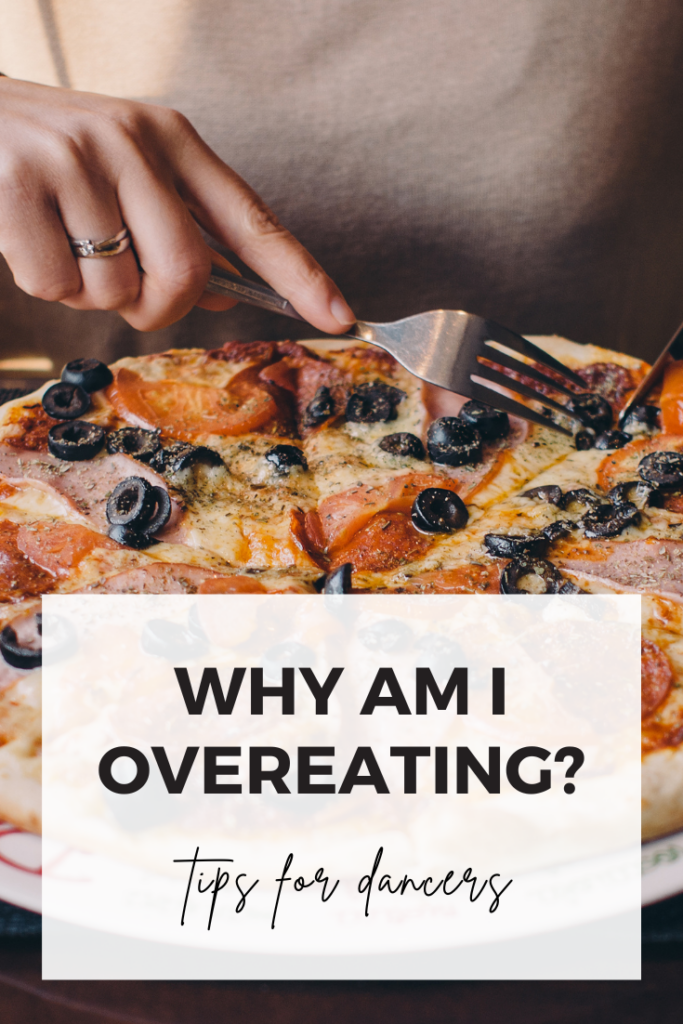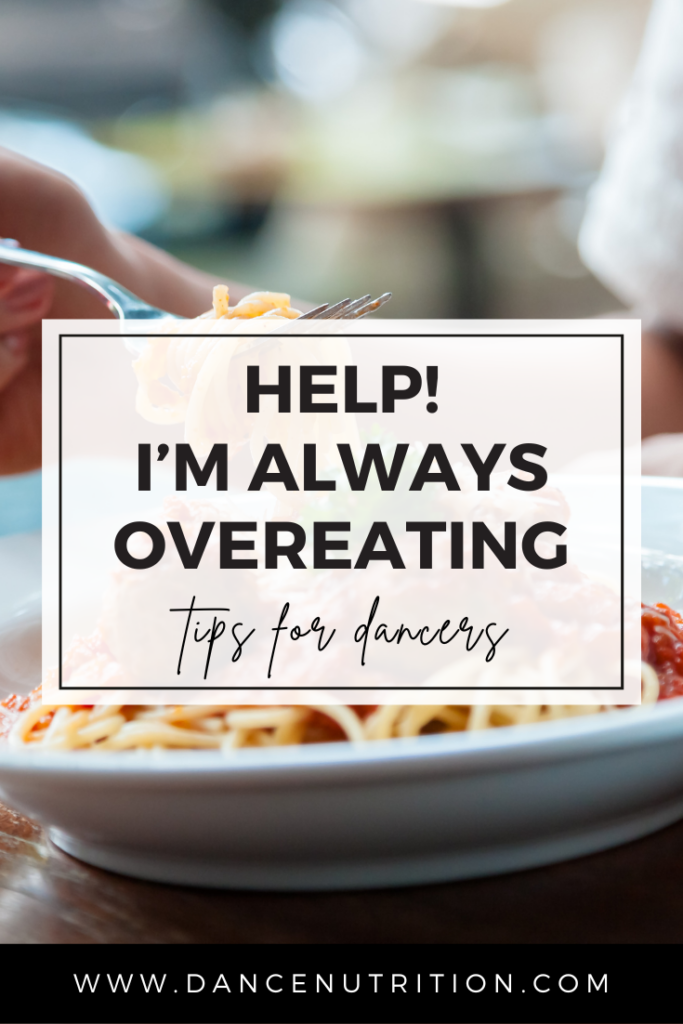If you’re reading this, then chances are you’re familiar with the experience of eating to the point beyond physical comfort. Perhaps it was during a holiday meal or over the weekend: despite feeling full, you kept eating. Before you knew it, the plate (or snack bag) was wiped clean and left you feeling a bit… ashamed.
In this article, we will uncover why dancers “over”-eat, what it means to binge eat, and how to break the cycle of feeling very in control around food to feeling very out of control around food. If you’re ready to finally quit “over”-eating, then keep reading, dancers.
What’s the difference between overeating and binge eating?
Though they might seem interchangeable, “over”-eating” is not the same as binge eating. Binge Eating Disorder (BED) is a life-threatening and treatable eating disorder with specific criteria known for diagnosis. BED It is characterized by:
- Recurring episodes of eating an amount of food in a discrete period (ie. within any 2 hours) that is larger than what most people would eat in a similar period.
- Eating often very quickly and until feeling uncomfortably full.
- A feeling of a loss of control during the binge.
- Eating alone because of feeling embarrassed by how much one is eating.
- Feeling disgusted with oneself, depressed, or very guilty afterward.
- Not regularly participating in compensatory behaviors like purging.
BED involves behaviors known to isolate and harm an individual’s well-being. If you feel that these behaviors are relatable, then it’s encouraged that you seek support immediately. I encourage you to visit the National Eating Disorder Association (NEDA) helpline. For this article, we’re focusing on “over”-eating, and while the experience can feel similar to that of a binge, does not involve the same degree of severity.
What does it mean to “over”-eat?
As you read, you’ll notice that I place the “over” in “over”-eating within quotation marks. This is because everyone’s definition of “over”-eating is vastly different. Since every dancer’s nutritional needs vary, there are no definitive criteria for determining what it means to “over”-eat (or eat past normal limits).
How we define “over”-eating is challenging within the context of today’s health and wellness culture because dieting and restrictive eating are normalized. As a result, most dancers severely underestimate their daily calorie needs, and eating past what is deemed “normal” might be far from “over”-eating.
Why am I “over”-eating?
Before we can strategically stop “over”-eating, we first need to identify the root cause. Eating to a point beyond physical fullness can result from a variety of reasons. For some, it’s the use of food as a tool to soothe during times of emotional distress. For others, the experience is related to food deprivation. It’s also likely that experiences of “over”-eating and/or binge eating are related to both of these root causes— an origin of using food to cope with distress, followed by weight gain and subsequent use of compensatory dieting behaviors thereafter.
Regardless, two helpful questions to consider when identifying your reason for “over”-eating is: (1) am I using food to soothe and (2) is there an identifiable point of deprivation that could be exacerbating this behavior?
Three specific points of deprivation can cause you to “over”-eat:
- Biological Deprivation involves eating too few calories to support your body’s physical and metabolic energy needs. If coming from a background of low-calorie dieting, then the feeling of “over”-eating is your body’s normal biological response as it makes up for the energy that wasn’t provided earlier.
- Psychological Deprivation involves restrictive food rules that prohibit you from eating certain types of foods or food groups. If you swear off pizza because you think it’s “bad” or unhealthy, then you’re bound to overeat. This psychological restriction is powerful enough to drive “over”-eating.
- Anticipated Deprivation is planning for a future restriction, such as with the desire to “start fresh” on Monday.
Another important consideration about deprivation is whether or not your point of deprivation is intentional or unintentional. The three examples mentioned above represent intentional restrictions.
But sometimes life happens and we run into instances when our schedule doesn’t allow for meal planning. Say for example your rehearsal lasts longer than expected. You may not have planned snacks and thus are likely to “over”-eat at your next meal. We may also “over”-eat simply because we’re enjoying our food. This is identified as taste hunger and it’s a topic I dive into here. You may also find yourself eating past fullness because of emotions. Read this article to learn more about emotional eating and the role in which deprivation exacerbates the experience. Food insecurity is another possibility— when food is not or will not be accessible for a prolonged period.
But I’ve stopped dieting! Why am I still overeating?
With this newfound knowledge about diet culture comes the desire to rebel against it. The frustration over years of dieting that for some, led to injury and burnout, is often why. This rebellion exists for one reason: survival. When we engage in disordered eating, our body rebels as a means to survive the energy deficit. An uptick in hunger hormones, shifts in cravings, and relentless food thoughts, among others, ensue. At this point, despite feeling physically full and perhaps not even needing more energy, these same mechanisms remain. You no longer want to restrict yourself, you just want to eat.
Diet culture has conditioned us to believe that when we “over”-eat, we lack willpower. Willpower, however, is a temporary form of control that is bound to fail as food restrictions drive your desire to eat. Diet culture utilizes the idea of “over”-eating as fear-based rhetoric in the testament to failed willpower. But actually, “over” eating is a direct result of the very diets we choose when striving for unrealistic body and performance goals. This is what fuels the cycle of compulsive eating.
We’ve heard this rhetoric before… here are a few articles that dive into topics of which diet culture utilizes the idea of willpower to shift the blame from diet to dieter:
How do I stop myself from eating too much?
Attempting to limit, “moderate”, or willpower away your inner rebel will only cause it to linger for longer. Deprivation is your point of intervention, not willpower. Start by ensuring that you’re eating enough (here’s an article to learn more about calories for dancers). A licensed dietitian can help you create a plan that consists of multiple meals and snacks spaced throughout your classes and rehearsals. Then, break those food rules.
From here, explore the possibility of a lingering dieting mentality. Might some foods (typically those not deemed “clean”) still feel “off limits?” Perhaps you’re still underestimating the amount of food your body needs in a day. Or, maybe your “cravings” aren’t such a bad thing, but rather, your body signaling its need for more carb-rich foods. With this work comes the practice of unconditional permission. Rather than fighting this inner rebel, use it to build your body of evidence (read more about The Healthy Dancer® Body of Evidence here). This is where working with a licensed dietitian becomes incredibly helpful.
How can I recover from eating too much?
#1: Get Comfortable
If you feel physical discomfort from “over”-eating and you’ve identified a point of deprivation, then consider your need for comfort. This does not mean that come tomorrow, you’re “starting over.” It also doesn’t mean that you have to make up for those extra calories with an additional workout. This mindset will only set you vulnerable to that dreaded cycle of undereating and “over”-eating.
Now it’s time to focus on digestion. If feasible, put on some comfy clothes and participate in gentle movement. Light stretching, yoga, breathing techniques, and foam rolling are examples. Then, up your hydration and focus on a balanced meal plan (neither needs to be obsessed over).
#2: Reflect and Move On
Understanding why you’re “over”-eating is the first step to addressing the behavior. Utilize this time for reflection and discovery. Reflect on the experience, outline a plan (maybe this means stocking a few extra snacks in your bag!), and if needed, seek a professional for more help. To move past the physical discomfort, consider comfortable clothing, gentle movement (yoga, foam rolling), and hydration. These can help to promote digestion whilst you utilize compassionate curiosity to assess and learn from the experience.




